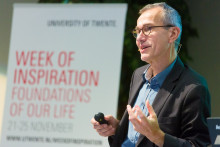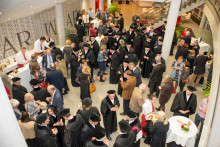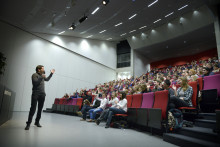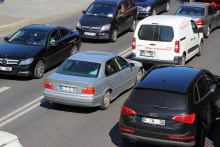Frank Vandenbroucke, currently a Professor at the University of Amsterdam and a former minister in the Belgian Federal Government, was the first speaker at the Week of Inspiration, which is taking place this week at the UT.
Founding fathers believed in convergence
Vandenbroucke’s lecture was titled ‘The social significance of the European Union: between naïve optimism and doom-mongering’ and it discussed whether the European integration is at odds with the national welfare states. ‘Founding fathers of the European Union were convinced that there was no clash, that integration would support economic progress and social cohesion and that social policy could safely remain at the national level. They believed in convergence,’ began Vandenbroucke.
‘This convergence machine worked until about 2004-2008. Since then we have seen an increase in inequality and poverty,’ continued Vandenbroucke. ‘There has been a divergence between the North and the South of the European Union, which is of course politically threatening. Why is this happening? One hypothesis is that there were originally six states involved, but now we have a union of 28 states. There might be too many differences among the states for the convergence machine to work.’

‘The EU has a design flaw’
According to Professor Vandenbroucke, there is a lot of inequality between individual European states. To fight this, the states need the capacity to develop a counterforce against inequality: ‘The key aspect is stabilization, the ability to withstand an economic shock. In the USA, 75% of all shocks hitting individual states were utilized. This is thanks to integrated capital market and the federal solidarity system, which we don’t have. If one American state has a problem, Washington steps in. Our system doesn’t work like that. We have to be able to stabilize and share risks, the current system is unstable.’
‘In the US, solidarity is supported at a federal level. The EU is not ready for that. We organize solidarity ex post, after the crisis hits,’ concluded Vandenbroucke. ‘This is not an issue of Europeanization, it is only a design flaw of a union without stabilizing mechanism.’
Week of Inspiration
The Week of Inspiration is held annually in the week leading up the UT’s Dies Natalis. This year’s edition carries the theme ‘Foundations of Life’ and it includes a series of lectures and events, all organized at the University of Twente. Visitors can enjoy, for instance, a performance by the ‘neuromagician’ Victor Mids or a lecture by a Nobel laureate Gerard ’t Hooft. Full program can be found here.







